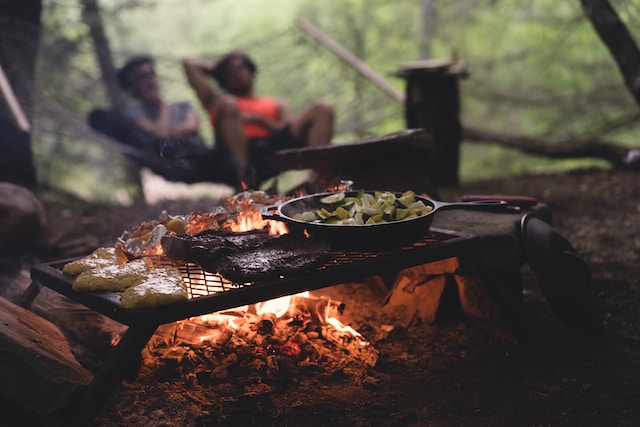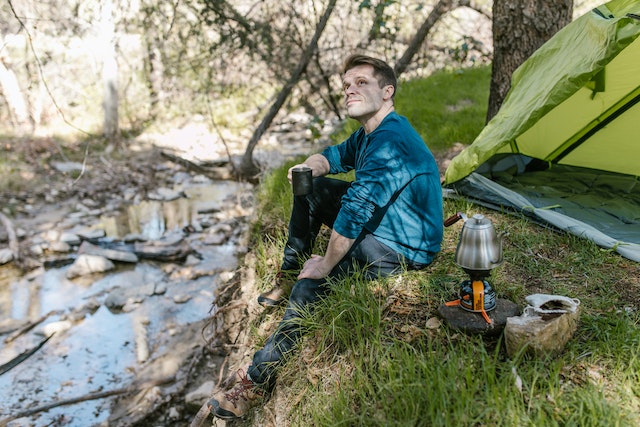
Venturing into the great outdoors offers a bounty of rewards for the adventurous soul. From awe-inspiring landscapes to the thrill of conquering new trails, backpacking is a remarkable way to connect with nature. Adhering to a vegan lifestyle should never dampen the spirit of wanderlust, as the plant-based path is equally gratifying amidst the vast wilderness. This guide aims to equip vegan backpackers with knowledge and tips to ensure a nourishing and sustainable adventure. So, tighten your boots, secure your pack, and let’s embark on a journey that harmonizes with the majesty of nature.
Planning Ahead for Vegan Backpacking
When it comes to vegan backpacking, a little bit of preparation goes a long way. Making sure you have the right supplies and knowledge beforehand will ensure a smooth and enjoyable journey into the wilderness. Here are some tips to help you plan ahead for your vegan backpacking adventure:
Research Vegan-Friendly Trails and Campgrounds
Before heading out, it’s essential to do some research on the trails and campgrounds that align with a vegan lifestyle. Look for destinations that have vegan-friendly options nearby or allow you to bring your own food. This way, you’ll be able to enjoy delicious plant-based meals while appreciating the wonders of nature.
Pack Lightweight and Nutrient-Dense Foods
When packing your backpack, opt for lightweight, energy-dense vegan foods that will provide sustenance and nourishment without weighing you down. Think of items like dried fruits, nuts, seeds, nut butter packets, energy bars, and dehydrated vegan meals, which are convenient and easy to prepare on the go.
Bring Plenty of Water and Hydration Options
Staying hydrated is crucial during any backpacking adventure, so make sure to bring an ample supply of water. Consider investing in a high-quality water filtration or purification system to access clean water from natural sources. Additionally, pack some electrolyte tablets or powders to replenish vital minerals and enhance hydration during strenuous hikes.
Master the Art of Meal Planning
To avoid food cravings or running out of vegan options, create a meal plan for your backpacking trip. This can help you determine the quantity and variety of ingredients you’ll need. Preparing some meals ahead of time, like overnight oats or homemade granola, can save you time and offer nourishing breakfast options in the great outdoors.
Learn About Foraging and Identifying Wild Edibles
While foraging for food in the wild requires expertise, you can learn basic skills to identify some edible plants or mushrooms along your hiking route. Remember to study plant identification guides beforehand and consult with local experts or park rangers to ensure you’re foraging safely and sustainably.

Embrace Sustainable Practices
Respecting the environment and minimizing your impact is essential in vegan backpacking. Use reusable containers and utensils, avoid single-use plastics, and properly dispose of waste. Leave no trace by following the principles of outdoor ethics, such as packing out all trash, staying on designated trails, and respecting wildlife and natural habitats.
Connect with Local Vegan Communities
If you’re exploring a popular vegan backpacking destination, reach out to local vegan communities or online forums to get insider tips on vegan-friendly spots, resources, or even hiking buddies. Engaging with like-minded individuals can enhance your experience and provide valuable insights into the best vegan food options in the area.
By planning ahead, embracing sustainable practices, and arming yourself with the right knowledge and supplies, vegan backpacking can be a fulfilling and harmonious journey.
Preparing Vegan Meals on the Trail
When it comes to vegan backpacking, preparing delicious and nutritious meals on the trail is not only essential but also an opportunity to get creative with your culinary skills. By following a few simple steps and utilizing lightweight cooking equipment, you can whip up mouthwatering plant-based meals that will satisfy your hunger and fuel your adventures.
1. Plan Your Meals in Advance
Before embarking on your vegan backpacking trip, spend some time planning your meals. Consider the duration of your journey, the availability of cooking facilities, and the ingredients you’ll need. Think about breakfast, lunch, dinner, and snacks, ensuring a good balance of protein, carbohydrates, and healthy fats.
2. Pack Lightweight Cooking Equipment
Invest in lightweight and compact cooking equipment to make meal preparation a breeze on the trail. Some essential items include a camping stove, a lightweight pot or pan, a collapsible water container, a utensil set, and a multi-purpose knife. Opt for durable, lightweight materials such as titanium or aluminum to minimize the weight in your backpack.
3. Opt for Dehydrated and Pre-Packaged Meals
Dehydrated vegan meals are an excellent option for backpacking adventures. These meals are lightweight and require minimal prep.

Often, they only need boiling water to rehydrate. Many outdoor stores offer a wide variety of vegan-friendly dehydrated meals, ranging from chili to stir-fry options. Just remember to read the ingredients list to ensure they align with your dietary preferences.
4. Get Creative with DIY Dehydrated Meals
For those who enjoy the art of DIY, consider dehydrating your own meals at home before your trip. You can dehydrate fruits, vegetables, beans, and even cooked grains to create your personalized backpacking meals. This allows you to control the ingredients, flavors, and portion sizes, ensuring a nutritious and satisfying meal while on the trail.
5. Embrace One-Pot Cooking
Prepare simple one-pot meals to minimize dishes and save on cooking time. One-pot pasta dishes, rice with mixed vegetables, or quinoa salad with canned beans can offer a delicious and filling meal. Customize these dishes by adding herbs, spices, or even dried fruits and nuts to elevate the flavors and provide additional nutrients.
6. Pack Nutritious Snacks
Snacks are essential for sustained energy and keeping hunger at bay throughout the day.

Pack a variety of vegan-friendly snacks such as energy bars, trail mix, dried fruit, vegan jerky, and roasted chickpeas. These snacks are lightweight, packed with nutrients, and perfect for quick energy boosts on the trail.
Staying Hydrated and Nourished
Hydration is key when embarking on a vegan backpacking adventure. Proper hydration helps maintain energy levels, aids in digestion, and keeps your body functioning optimally. Here are some tips to stay hydrated and nourished while exploring the great outdoors:
- Carry a Reliable Water Filtration System: Ensure a continuous supply of clean water by investing in a reliable water filtration or purification system. This will allow you to safely drink water from natural sources such as rivers, streams, or lakes, reducing the need to carry excessive amounts of water with you.
- Pack Electrolyte-Rich Drinks: In addition to water, it’s essential to replenish electrolytes lost through sweating. Carry electrolyte tablets or powders that can be easily added to your water to help maintain proper hydration and avoid muscle cramps.
- Include Hydrating Fruits and Vegetables: Pack a variety of hydrating fruits and vegetables that are easy to carry and consume on the trail. Water-rich foods such as watermelon, cucumber, oranges, and berries not only provide hydration but are also packed with essential vitamins and minerals.
- Consider Nut Butter: Nut butter is a compact and nutrient-dense source of healthy fats and protein. Pack small individual servings of nut butter, such as almond or peanut butter, to enjoy as quick and satisfying snacks throughout the day.
- Opt for Lightweight and Nutrient-Dense Snacks: Choose lightweight, plant-based snacks that provide sustained energy and nourishment. Trail mix, energy bars, and dehydrated fruit are convenient options that are easy to pack and consume while on the move.
- Hydrate with Herbal Teas: Bring along a selection of herbal teas to enjoy hot or cold. Chamomile, peppermint, or ginger teas can provide soothing properties and hydration during your backpacking adventure.
Remember, staying hydrated and nourished is vital for maintaining stamina and enjoying your vegan backpacking experience to the fullest. Listen to your body’s needs, hydrate regularly, and fuel up with wholesome plant-based foods to keep your adventure going strong.
Navigating Vegan Challenges in the Wild
As a vegan backpacker, there may be certain challenges that you encounter while exploring the great outdoors. However, with a little preparation and creativity, you can easily navigate these hurdles and ensure a fulfilling plant-powered adventure. Here are some tips to help you overcome common vegan challenges while backpacking:
- Communicate Your Dietary Needs: When booking campsites or joining group hikes, don’t hesitate to communicate your dietary preferences and needs ahead of time. Let the organizers know that you follow a vegan diet and inquire about the availability of vegan-friendly options. This will help ensure that you have suitable meals and snacks during your backpacking journey.

- Bring Portable Cooking Tools: To have more control over your meals, consider packing portable cooking tools such as a mini camp stove, collapsible pots, and utensils. This way, you can cook your own meals using fresh ingredients and enjoy a variety of vegan dishes while on the trail.
- Dehydrate Your Own Meals: If you prefer homemade meals over pre-packaged options, consider dehydrating your own meals before your backpacking trip. Dehydrated fruits, vegetables, plant-based proteins, and grains can be rehydrated on the trail, allowing you to enjoy personalized, nutrient-rich meals that cater to your vegan lifestyle.
- Plan for Food Resupply Points: If you’re embarking on a longer backpacking trip, research the availability of food resupply points along your route. Look for grocery stores, farmers’ markets, or stores that offer vegan-friendly options. This way, you can restock your supplies, ensuring you have fresh produce and other essentials to sustain you throughout your journey.
- Utilize Local Resources: When backpacking in a new area, take advantage of local resources to find vegan-friendly restaurants, farmers’ markets, or grocery stores. Engaging with the local community will not only provide you with delicious vegan options, but you may also discover unique plant-based dishes that you can enjoy on your journey.
- Embrace Wild Foraging: As a vegan backpacker, you can explore the art of wild foraging and learn to identify edible plants in your surroundings. However, it’s essential to acquire knowledge on safe foraging practices and familiarize yourself with local regulations. This way, you can supplement your meals with fresh, wild foods, adding an intriguing element to your backpacking experience.
- Create Flavorful Seasonings: To add flavor to your meals without carrying bulky ingredients, create your own homemade seasoning blends. Mix together herbs, spices, and dried vegetables in small containers or spice bags. These compact additions will elevate the taste of your meals and ensure you don’t compromise on flavor while backpacking.
- Carry Vegan Snacks: Pack an assortment of vegan snacks that are lightweight, non-perishable, and easy to consume on the trail. Consider options such as energy bars, trail mix, dried fruits, and vegan jerky. These snacks will provide quick and convenient fuel during breaks and keep you energized throughout your backpacking adventure.
- Cultivate a Positive Mindset: Approach vegan backpacking challenges with a positive mindset and see them as opportunities for growth and creativity. View each obstacle as a chance to learn, adapt, and expand your culinary skills in the wild. By embracing challenges, you’ll find that vegan backpacking becomes an even more rewarding and fulfilling experience.

Remember, being prepared, adaptable, and confident in your vegan choices will help you navigate any challenges that may arise while backpacking. With determination and a little resourcefulness, you can fully embrace the wonders of vegan backpacking while immersing yourself in the splendor of the natural world.